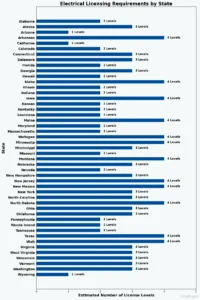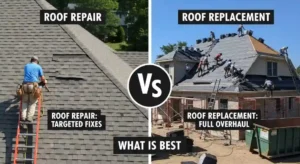Since the invention of the lightbulb, electricity has become a necessary part of our lives. The person who maintains this electrical system is known as an electrician. These people play an important role in providing us with a comfortable and enjoyable system.
Electricians are highly skilled persons who need continuous training to stay up to date with the rules and regulations of the state. They need to be really continuous to perform their job safely and securely. Each state has different laws for the electricians, let them know one by one.
What is an electrician license?
An electric license is an official certificate that proves that an individual has the necessary skills required to work safely with the electrical system. This license verifies that you have professional requirements to perform various tasks such as
- Wiring
- Installation
- Maintaining Electrical System
However, requirements to obtain a license vary from state to state. However, every state has two basic requirements to issue a license.
- Hands-on experience
- Passing a licensing exam
Whether you want to work independently or want to be a part of the electrician business, obtaining a license is essential to ensure safety and compliance with local laws and regulations.
Do I have to have a license to do electrical work?
In most cases, you have to obtain a license to perform any electrical work legally. The licenses are typically divided into three categories based on your experience and expertise. These are Apprentice, journeyman, and master.
However, these requirements are not the same among all states. For example, some states like Indiana do not require a license to do any electrical work but you have to follow local law and regulation before any work. So it is compulsory to understand the laws of the state in which you want to start a business as an electrician.
What types of licenses are available in the electrical trade?
In electrical trade usually there are three main categories of licences.
- Apprentice Electrician: This is the starting phase of a person as an electrician. They usually work under an experienced person to gain hands-on experience. Also, they may attend training sessions to enhance their skills and knowledge.
- Journeyman Electrician: Once an individual passes the exam and completes a specific time period of working under supervision they become a journeyman. They can legally do any electrical work individually but may need help from seniors for some complex projects.
- Master Electrician: A person becomes a master electrician when they have great experience in the field. They become able to supervise others and can take on large and advanced projects.
How is professional licensing different from business licensing for electricians?
Professional licenses and business licenses have different purposes. Professional license certificates that you have the skills and knowledge required to do work as an electrician. This license is compulsory for all three levels and is issued by the state or local electrical board.
On the other hand, a business license is required if you want to start your own electrical contracting business. It allows your company to work in specific areas and make sure that you;
- Meet local safety standards.
- Follow tax regulations
- Reliable for customers
Electrical licensing requirements: A state-by-state guide

Alabama
In Alabama, you need a license to do electrical work. The Alabama Electrical Contractors Board handles licensing. If you’re starting out, you’ll work as an apprentice under a licensed electrician. To get your own license, you’ll need experience, pass an exam, and follow state rules like carrying insurance.
Alaska
Alaska requires electricians to be licensed through the Department of Labor and Workforce Development. You can apply for different licenses, like journeyman, administrator, or contractor. Becoming a journeyman means completing training hours and passing an exam. Contractors need a separate license and must follow all local rules.
Arizona
In Arizona, you must have a contractor’s license to work as an electrician. The Arizona Registrar of Contractors manages this. To qualify, you’ll need work experience, pass an exam, and show financial stability. Apprenticeships are available to help you get started.
Arkansas
Arkansas requires electricians to have a license from the Department of Labor and Licensing. There are licenses for apprentices, journeymen, masters, and contractors. You’ll need to complete training, gain experience, and pass an exam. Contractors also need liability insurance.
California
In California, electricians working on projects over $500 need a C-10 Electrical Contractor License from the Contractors State License Board. You can qualify by completing an apprenticeship or gaining years of experience. Ongoing education is encouraged to keep skills updated.
Colorado
Colorado requires contractors to have a state license to do electrical work. The State Electrical Board manages this process. You’ll need experience, pass an exam, and meet local rules since some cities also issue their own licenses for journeymen and apprentices.
Connecticut
Connecticut requires all electricians to have a license from the Department of Consumer Protection. There are licenses for journeymen, contractors, and specialists. To get licensed, you need to,
- Complete training
- Gain work experience
- Pass an exam
Delaware
Delaware’s Division of Professional Regulation licenses electricians at different levels, like apprentice, journeyman, and master. To get a license, you’ll need documented training and must pass an exam. If you’re licensed in certain other states, Delaware may accept your credentials.
Florida
In Florida, electricians need a license from the state or local authorities, depending on the work type. The Department of Business and Professional Regulation handles state-level licensing. To qualify, you need experience, to pass an exam, and to meet financial requirements. Local rules may also apply.
Georgia
Georgia requires electricians to have a license from the State Construction Industry Licensing Board. Apprentices work under licensed professionals. To get your own license, you’ll need training, experience, and to pass an exam. Contractors must meet extra requirements like insurance coverage.
Hawaii
If you want to work as an electrician in Hawaii, you’ll need a license from the Department of Commerce and Consumer Affairs (DCCA). There are two main licenses: journey worker electrician and supervising electrician.
To qualify, you’ll need the right mix of education, work experience, and a passed exam. Apprentices must register and work under licensed electricians. Hawaii follows the National Electrical Code (NEC) to ensure safety.
Idaho
Idaho requires electricians to have a license issued by the Division of Building Safety (DBS). Licenses range from apprentice to journeyman, master electrician, and electrical contractor. Most electricians start as apprentices, gaining hands-on experience and classroom training before advancing. Exams are required to move to the next level.
Illinois
Illinois doesn’t have statewide rules for electricians. Instead, cities and towns handle licensing. For example, Chicago has its own system for electrical licenses, while smaller areas may not require one. Common licenses include journeyman and electrical contractor. Make sure to check the local rules where you want to work.
Indiana
Indiana doesn’t have statewide electrician licenses either. Cities and counties manage their own rules. Bigger cities like Indianapolis and Fort Wayne often require journeyman or master electrician licenses. Always check local requirements and follow the National Electrical Code (NEC).
Iowa
Iowa requires electricians to have a license issued by the Iowa Electrical Examining Board. Licenses include apprentice, journeyman, master electrician, and electrical contractor. You’ll need to complete training, gain work experience, and pass an exam. Apprentices must also register and work under a licensed electrician.
Kansas
Kansas doesn’t have statewide electrician licensing rules. Instead, each city or county sets its own requirements. For example, places like Wichita and Kansas City require licenses such as a journeyman or master electrician. Before starting work, check the local guidelines for your area.
Kentucky
Kentucky electricians need a license from the Department of Housing, Buildings, and Construction. You can apply for a journeyman or electrical contractor license after completing training and gaining experience. Passing a licensing exam is also required, and you’ll need to stay up to date with continuing education.
Louisiana
In Louisiana, the State Licensing Board for Contractors (SLBC) handles electrician licenses for commercial and industrial work. For smaller jobs, local governments may issue licenses for journeymen and master electricians. Be sure to check the rules for your city or town.
Maine
Electricians in Maine need a license from the Electricians’ Examining Board. The state offers several licenses, including helper, journeyman, master, and limited electrician. You’ll need a mix of classroom training, work experience, and a passed exam. Maine also follows the NEC for safety rules.
Maryland
In Maryland, licensing depends on where you work. The State Board of Master Electricians issues statewide licenses for master electricians, but journeyman licenses are handled by local counties. Each area has its own rules, so check the requirements in your county.
Massachusetts
To work as an electrician in Massachusetts, you need a state license. The Board of State Examiners of Electricians issues licenses for journeyman and master electricians. Apprentices must be registered and complete training. There are also requirements for continuing education.
Michigan
Electricians in Michigan must be licensed by the Department of Licensing and Regulatory Affairs (LARA). There are different licenses for apprentice, journeyman, master, and electrical contractors. Apprentices need to be registered and work under a licensed electrician. All electrical work must follow state codes.
Minnesota
In Minnesota, the Department of Labor and Industry handles electrical licensing. There are licenses for apprentices, journeyman electricians, master electricians, and electrical contractors. Apprentices must complete training before they can take the exam for a journeyman license.
Mississippi
Mississippi requires electricians to have a state license for certain types of electrical work. The State Board of Contractors issues licenses for electrical contractors, while local governments manage licenses for journeymen and master electricians. Work must comply with local building codes and the NEC.
Missouri
Missouri doesn’t have a state license for electricians, so requirements vary by city or county. In cities like Kansas City and St. Louis, you need a license to work as a journeyman or master electrician. Smaller areas may have fewer requirements, but you still need to follow local codes.
Montana
Montana requires electricians to be licensed by the Montana State Electrical Board. You can hold a license as an apprentice, journeyman, master electrician, or electrical contractor. Journeyman electricians must complete 8,000 hours of training, and master electricians need even more experience and must pass an exam.
Nebraska
In Nebraska, the State Electrical Division issues licenses for electricians. Licenses are available for apprentices, journeyman electricians, and electrical contractors. There is no master electrician license, but contractors can supervise electrical work. Electricians must follow safety regulations and the NEC.
Nevada
Nevada requires electricians to hold a license issued by the State Contractors Board. There are licenses for journeyman electricians and contractors. To become a journeyman, you need to pass an exam and meet work experience requirements. Contractors need extra paperwork, including proof of insurance.
New Hampshire
In New Hampshire, the Electricians’ Licensing Board manages licenses for electricians. You need a license as an apprentice, journeyman, or master electrician. Apprentices must register and complete a training program before applying for a journeyman license.
New Jersey
In New Jersey, electricians must be licensed by the New Jersey Division of Consumer Affairs. The state offers licenses for apprentice, journeyman, and master electricians.
- Apprentices must complete a formal training program, while journeymen must have substantial work experience and pass an exam.
- Master electricians need additional years of experience and a higher-level exam.
- Electrical contractors must hold a separate business license.
New Mexico
New Mexico requires electricians to hold a license issued by the Construction Industries Division (CID). Licenses include apprentice, journeyman, master, and contractor. To obtain a journeyman license, you must complete a state-approved apprenticeship program and pass an exam. Master electricians require additional work experience and may need to pass a more advanced exam.
New York
In New York, the licensing process varies by locality. Cities like New York City require electricians to hold a license issued by the Department of Buildings. G
Generally, electricians must be registered apprentices or journeymen, and they must pass an exam to become licensed. Master electricians can oversee larger projects and are responsible for ensuring compliance with city codes and regulations.
North Carolina
In North Carolina, electricians must be licensed by the North Carolina Board of Examiners of Electrical Contractors. The state issues licenses for journeyman, master, and electrical contractors.
- To qualify for a journeyman license, applicants must complete an apprenticeship and pass an exam.
- Master electricians need more experience and must pass a higher-level exam.
- Electrical contractors must meet additional business-related requirements.
North Dakota
North Dakota requires electricians to obtain a license from the North Dakota State Electrical Board. The state offers apprentice, journeyman, and master electrician licenses. Apprentices must complete a training program, and journeymen must have at least four years of experience.
Master electricians must have more experience and pass an advanced exam. Electrical contractors must also be licensed separately.
Ohio
In Ohio, electricians must be licensed by the Ohio Construction Industry Licensing Board (OCILB). There are different licenses for journeyman electricians, master electricians, and electrical contractors.
To qualify for a journeyman license, applicants must complete an apprenticeship and pass an exam. Master electricians require additional experience, and contractors must meet business-related criteria such as insurance and bonding.
Oklahoma
Oklahoma requires electricians to be licensed by the Oklahoma State Department of Labor. The state offers licenses for apprentices, journeymen, and electrical contractors. Journeymen must pass an exam and complete a certain number of training hours. Electrical contractors must hold a separate license that involves additional business-related requirements, including bonding and insurance.
Pennsylvania
Pennsylvania does not have a state-wide electrician license requirement. Instead, licenses are issued at the city or county level. For example, cities like Philadelphia and Pittsburgh require electricians to be licensed locally. Generally, you’ll need to complete an apprenticeship, gain work experience, and pass an exam. Check the specific requirements in your city or county.
Rhode Island
In Rhode Island, electricians must be licensed by the Department of Labor and Training. There are two main licenses:
- Journeyman
- Master.
To become a journeyman, you need to complete an apprenticeship, work under a licensed electrician for a specific number of hours, and pass an exam. Master electricians need additional work experience and must pass another exam.
Tennessee
Tennessee requires electricians to be licensed through the Department of Commerce and Insurance. Local licenses are also required in many counties and cities. A journeyman electrician license involves completing an apprenticeship or technical training, gaining experience, and passing an exam. Electrical contractors need a state license if they work on projects valued at $25,000 or more.
Texas
In Texas, electricians must be licensed by the Texas Department of Licensing and Regulation (TDLR). There are several license types, including apprentice, journeyman, master, and electrical contractor.
To become a journeyman, you need to complete an apprenticeship program, gain work experience, and pass an exam. Master electricians require more experience and must pass a higher-level exam. Electrical contractors must carry insurance to get their license.
Utah
Utah licenses electricians through the Division of Occupational and Professional Licensing (DOPL). There are apprentice, journeyman, master, and contractor licenses available.
- Apprentices must work under a licensed electrician and complete classroom training.
- Journeyman electricians need several years of experience and must pass an exam.
- Master electricians require additional experience.
Virginia
Virginia electricians are licensed by the Department of Professional and Occupational Regulation (DPOR). The state offers journeyman, master, and contractor licenses. To become a journeyman, you need to complete an apprenticeship, gain experience, and pass a trade exam.
Master electricians need more experience and must pass a different exam. Electrical contractors must also provide proof of insurance and meet business requirements.
West Virginia
Electricians in West Virginia are licensed by the State Fire Marshal’s Office. Licenses include apprentice, journeyman, and master electrician. Apprentices work under supervision and complete training. Journeyman electricians need work experience and must pass an exam. Master electricians require additional experience and must pass a higher-level exam.
Wisconsin
In Wisconsin, electricians are licensed by the Department of Safety and Professional Services (DSPS). Common licenses include journeyman, master, and contractor. Journeyman electricians must complete an apprenticeship and pass an exam. Master electricians need extra experience and must pass an advanced test. Contractors must meet insurance and business requirements.
Vermont
In Vermont, electricians must get a license from the Department of Public Safety. There are different licenses: journeyman, master, and electrical contractor. To become a journeyman, you need to complete an apprenticeship, gain work experience, and pass an exam. Master electricians need more experience, and electrical contractors need a separate license with proof of experience and a trade exam.
Washington
In Washington, electricians need a license from the Department of Labor and Industries (L&I). There are licenses for journeyman electricians, master electricians, and electrical contractors. To become a journeyman, you need to complete an apprenticeship, get experience, and pass an exam.
Master electricians need more experience, and electrical contractors must show proof of insurance and pass a contractor exam. Washington also requires electricians to continue their education to keep their licenses active.
Wyoming
Wyoming does not have a state license for electricians, but some cities, like Cheyenne and Casper, require local licenses. To get a license, you typically need to complete an apprenticeship, gain work experience, and pass an exam. Electrical contractors may have extra requirements depending on the city.






